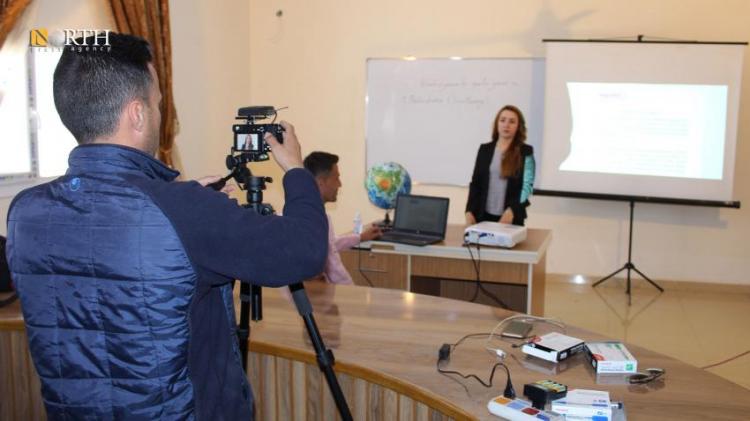Kobani – North-Press Agency
Fattah Issa – Fayad Muhammad
The Education Authority in the Euphrates region has finished recording about 20% of the curriculum for third year high school students in its literary and scientific branches through videotaping, to compensate students who cannot attend school due to measures to prevent the spread of the novel coronavirus.
Abd al-Razzaq Muhammad, the co-chair of the Education Authority in the Euphrates region, told North-Press that they started the project 15 days ago, so that all the lessons of the curriculum for third year high school students in the Autonomous Administration in its literary and scientific branches will be recorded via video.
According to Muhammad, the recorded videos will be published on the Rojava TV channel of the Autonomous Administration in North and East Syria, on social media platforms, and on YouTube at the beginning of next May.
The risk of the spread of the coronavirus has left 789,225 students across northeastern Syria without schools, where 4,137 schools have been closed in accordance with the lockdown imposed by the Autonomous Administration, according to the Education Authority in northeastern Syria.
New experience
According to the Education Authority in the Euphrates region, about 20 teachers are participating in the project, who are recording the educational curriculum in the Kurdish language at the headquarters of the Education Authority, while the curriculum for the third class high school in the literary and scientific branches will be recorded in Arabic soon after a meeting with Arab third class high school teachers.
Nisreen Sheikh Muhammad, a geography teacher in the schools of Kobani, said that the teachers record the lessons six days a week within the "Our Home is Our School" project, where three days are devoted to recording the lessons of the curriculum of the scientific branch and three days for the literary branch.
Each teacher records two lessons per week, about 20 minutes per lesson, using the whiteboard and projection techniques, according to the geography teacher.
She said: "Video education is a bit rigid, being our first experience, while classroom education is more interactive."
The project aims to prevent students from dropping out of school and to secure communication with them inside their homes, in light of the procedures of closing schools, which is considered necessary by teachers of the Education Authority to preserve their health and ensure their safety from infection with coronavirus that has spread in most of the world.
إرساءTwo weeks ago, the Education Authority in al-Jazira region began to record the educational curriculum for secondary and high school students to be shown on television channels and websites, provided that the elementary classes are prepared later.

